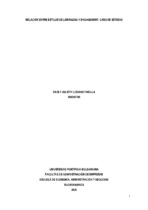Relación Entre Estilos De Liderazgo Y Engagement: Caso De Estudio
Fecha
2020-09Director/Asesor
Director. Uribe Rodríguez, Ana Fernanda
Tipo de contenido
Tesis de Maestría
Citación
Metadatos
Mostrar el registro completo del ítemDocumentos PDF
Resumen
El presente trabajo de grado tiene como objetivo analizar la relación entre los estilos de liderazgo y el engagement de los trabajadores operativos de una empresa industrial de Santander; con el fin de conocer el nivel de estas variables dentro de la organización, describir la relación encontrada e identificar los estilos de liderazgo que generan mayor compromiso en los trabajadores. Es una investigación con enfoque cuantitativo de tipo correlacional y con un diseño no experimental de corte transversal (Hernández, Fernández y Baptista, 2014). La muestra estuvo conformada por 74 trabajadores, con edades comprendidas entre los 18 y 63 años, a los cuales se les aplicó el Cuestionario de Estilos de Liderazgo (CELID) desarrollado por Castro y Nader (2004) y la Encuesta de Bienestar y Trabajo (UWES) desarrollada por Schaufeli y Bakker (2003). Los resultados demuestran correlaciones positivas y significativas entre el liderazgo transformacional y sus factores con el engagement y sus factores. Además, se halló una correlación negativa entre el liderazgo laissez faire y el engagement. The objective of this degree work is to analyze the relationship between leadership styles and the engagement of operational workers in an industrial company in Santander, in order to know the level of these variables within the organization, describe the relationship found and identify the leadership styles that generate greater commitment in the workers. It is a research with a correlational quantitative approach and with a non-experimental cross-sectional design (Hernandez, Fernandez & Baptista, 2014) The sample was made up of 74 workers, aged between 18 and 63, to who were applied the Leadership Styles Questionnaire (CELID) developed by Castro and Nader (2004) and the Well-being and Work Survey (UWES) developed by Schaufeli and Bakker (2003). The results show positive and significant correlations between transformational leadership and its factors with engagement and its factors. Furthermore, a negative correlation was found between laissez faire leadership and engagement. Organizations in their need to be competitive, must be prepared and adapt to the different changes represented
by the interaction with the external and internal environment. The actions to be implemented in corporate
strengthening and organizational sustainability are based on the characterization of the interest groups and levels
of the organization, which allows strengthening the value chain by strengthening the networks with the actors. An
intangible attribute called Social Capital is measured, which generates organizational growth strategies through
the behavior of external and internal stakeholders. A tool that provides the basis for competitiveness, business
sustainability and organizational strategy. The Caja Santandereana de Subsidio Familiar - CAJASAN, always
implements the reengineering of its processes hand in hand with the progress of its corporate governance and
evolution of the organization. Stakeholders are characterized at the external level, the Affiliates, Allies and
suppliers, at the internal level, the Board of Directors and the collaborators, at the strategic, operational and
tactical organization levels. A measurement instrument model from Orkestra, the Eskuera Institute of
Competitiveness, supported by the University of Deusto in Spain, the Manual for the self-assessment of social
capital in organizations is applied, the constructs and variables to be measured in the organization were adapted.
The information analysis was supported by descriptive means, data correlation and factor analysis, as an added
value the analysis of the organizational networks is given by the Ucinet software. The results were evidenced by
means of a SWOT matrix, with its strategic report and the analysis of the networks. This study is an input for
decision-making, as the origin of the relationship with interest groups and organizational social capital, a strategic
organizational tool with the stakeholders of the system.
Palabra/s clave
Maestría en Administración
Colecciones
El ítem tiene asociados los siguientes ficheros de licencia:


